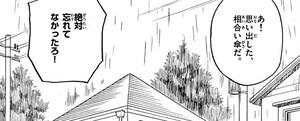Starting something with 〜出す
Grammar: Time and Sequence
Appending 出す to the base of a verb (the ます stem) adds the meaning of starting the action of that verb.
〜出す is used actions which are abrupt and non-volitional.
In English, 〜出す may translate as “starting to 〜” or to “〜 out”, depending on the verb.
Related Grammar
- 〜始める
- Used for the start of other actions.
- Managing to complete an action with 〜終える
- Used when effort is required to complete an actions.
- Completing an action with 〜終わる
- Used when effort is not required to complete an actions.
Examples
Figuring out the password with 見つけ出す

Kei’ichi must enter the university system to add a record showing Belldandy is enrolled. He only has a brief window of opportunity before Professor Ozawa logs into the system and discovers she isn’t enrolled. The only thing standing in Kei’ichi’s way is the university’s enrollment records password protection.
- 田宮:
- 「早く パスワードを見つけ出さんと」
- “If you don't hurry and figureout that password...”
Suddenly remembering with 思い出す

Takagi and Nishikata share an umbrella to walk home after school. Takagi says she completely forgot the term for two people sharing an umbrella. Nishika, with embarrassment, mutters that it’s あいあいがさ. When Takagi asks him to repeat it louder, he keeps quiet in his embarrassment.
- 高木:
- 「あ! 思い出した、相合い傘だ。」
- “Ah, I justremembered, it's 相合い傘.”
- 西片:
- 「絶対忘れてなかったろ!」
- “You totally didn't forget it!”
Nishikata’s embarassment stems from あい being the same pronunciation as 愛, a coincidence that lends to the idea of romance between two people who share an umbrella.